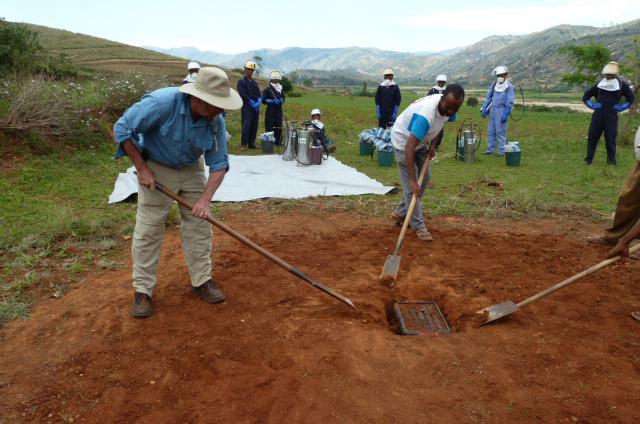Tufts alum wins USAID award for malaria-fighting innovation

Peter Chandonait, who received an M.S. in Civil and Environmental Engineering and a Masters of Public Policy from Tufts, won a USAID Innovation to Action Award for creating and implementing a mobile soak pit (MSP), designed to remove insecticide from wash-water generated during indoor residual spraying.
Indoor residual spraying is a process that helps kill mosquitos, thereby reducing the spread of malaria. However, the process can be time-consuming and harmful without proper cleaning and safety measures in place. The soak pit is an integral part of cleaning up after the spraying process, decontaminating the water used to wash equipment and creating a safer, more productive environment for malaria control programs.
Soak pits are usually permanent, centrally-located installations that degrade traces of insecticide in wastewater created by spraying. However, in more remote regions, the MSP created by Chandonait and his team replaces the large, fixed in-ground filter, and the mobile nature of the soak pits allows for easy and accessible cleaning wherever the spray operators are at end of a spray day.
Chandonait is currently the Principal Associate of the International Health Division of Abt Associates, a Cambridge-based consulting organization specializing in research and program implementation in health, social and environmental policy, and international development. He is also the Director of Environmental Compliance and Safety for PMI's Africa Indoor Residual Spraying (AIRS) project. He established an Environmental Compliance Assurance Program for the initiative, and introduced several innovations for more efficient and safer IRS processes. Chandonait first created the MSP method in a home laboratory, before conducting field testing in Madagascar in 2013 and 2014.
The Innovation to Action Award is given to USAID staff or partners who demonstrate exceptional leadership in team efforts to test or implement innovative techniques as part of current or recently closed USAID projects.
Department:
Civil and Environmental Engineering